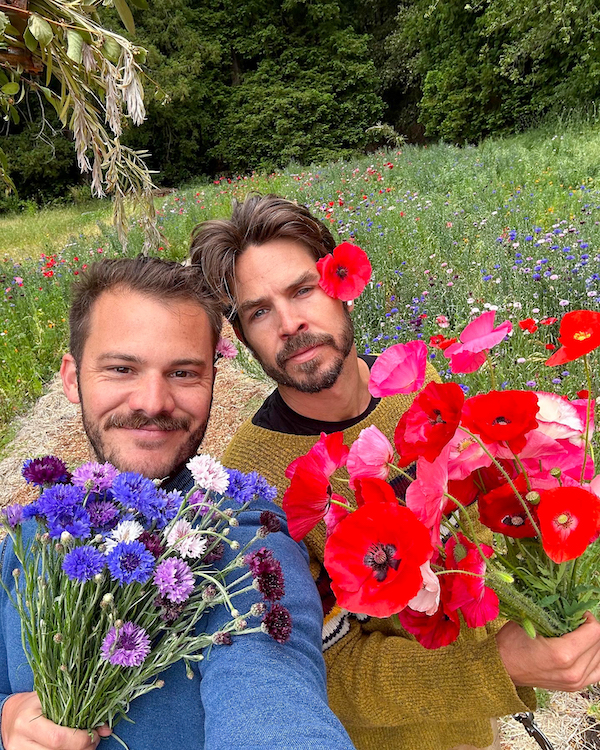Hello! We’re Nick and Spencer, and we started Solarpunk Farms almost three years ago. We come from non-farming backgrounds—Spencer from biology and climate science and Nick from sustainable business strategy—but are now permaculturists-in-training. Our two-acre farm is two parts food forest (we have about 70 trees planted so far) and one part organic vegetable and flower garden. We haven’t figured out our specialty yet and instead are choosing to experiment with growing as many varieties of things as possible, but have found our tomatoes are a big hit.
We’re an unconventional farm, more a queer-run nonprofit focused on making the sustainable revolution seem irresistible. Our overall goal with SPF is to create a regenerative-lifestyle demonstration site, engaging the public with a sustainable, equitable vision of the future that seems achievable and distinctly desirable. We want to create a space where people can experience what pro-climate values look, smell, taste, and feel like.
Describe a typical day on your farm.
Since we are a new farm that started from scratch there is no true typical day. It could be anything from planting trees to setting up irrigation, to working on different restoration projects, or (once again) trying to fence out the deer. Our perfect day, on the other hand, would be spent in the garden planting, pruning, harvesting, jamming, and cooking.
Generally, our days start with us getting up early to work on our off-farm jobs, and then end with us working on the farm until sundown. We also spend a large chunk of our time doing research and community outreach since we’re in the process of turning SPF into a community-based education and eco-tourism space.
Name three unexpected sensory delights of farming.
Farming puts you in much closer contact with the elements and raises your awareness of moisture, temperature, and sun placement. One of the unexpected delights of our farm is the temperature change between our front sunny farm area and the redwood forest area in the back. We love having different zones we can retreat to depending on the weather and planting our perennials based on where they will thrive.
After living in cities our whole lives, through farming and land stewardship, we are slowly acquiring what we call Plant Goggles. We now notice and recognize plants in detail that were once invisible to us, an incredibly joyful experience.
Another is laughter. As a very new farm that is relying on the help of a lot of mentors and volunteers, farming at SPF is very communal. Even if we’re kneeling in mud and cursing our archnemesis Bermuda grass, there are always others around to laugh with.
What sustainable or environmental practices are you most proud of?
Our whole mission is sustainability, but one of our favorites is our vermiculture composting system. Our friend Kourtnii Brown started Common Compost and gave us her very first flow-through vermiculture system. It’s an amazing way to cycle all of our food waste back into the food system. We blend any leftover food or plant material into a worm smoothie which our worms then transform into worm castings which can be used as an incredible soil amendment and foliar (fertilizer) spray.
If you could change one thing about the food industry, what would it be and why?
One thing we talk about a lot is improving incentives. Price is often the main thing that prevents people from buying better quality food, which is seen as more expensive. But the reality is that the price of “bad” food (like factory-farmed meat) is kept artificially low by subsidies. It would be a massive step forward for us to realign our national investments with our national interests—and use these resources to reduce the cost of healthy, sustainable, local foods instead.
What is your greatest challenge as a farmer?
Well, first and foremost, we don’t really consider ourselves farmers. We believe that the people who deserve that title are so much more knowledgeable and face totally different challenges than we do (and most importantly, feed a lot more people!). Our farm is much more about education and engaging people in more sustainable behaviors and a more sustainable food system.
As such, one of our biggest challenges is trying to create positive behavior change in a system that incentivizes and profits off behaviors that are harmful to our communities and our environment. We work toward making systemic change that will make the easiest and most enjoyable choices the ones that are healthiest for people and planet.
Also, Bermuda grass.
When you’re not farming, what are you doing?
When we’re not farming, we’re working at our other jobs or building infrastructure at SPF. Off-farm, Spencer is a scientist who works at the nonprofit One Earth. He helps communicate science-based climate solutions across renewable energy, nature conservation, and regenerative agriculture. Nick is a strategy consultant who works with agriculture companies in order to help them create better products and processes with hopes of increasing demand for sustainability among everyday eaters.
Where can people find your products?
As we ramp up our actual food production (which we almost exclusively sell to local businesses in Guerneville), our true products are “education” and “inspiration” which can either be found by following us on instagram @solarpunkfarms or by coming to one of our events in the near future.

